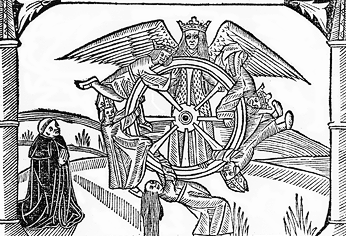Medieval tragedy
The medieval concept of tragedy was quite different from that of classical literature. Tragedy was less the result of individual action than a reflection of the inevitable turning of Fortune's wheel.
In the illustration, Fortune, traditionally female because of the association of women with the moon and changeability, stands behind the wheel with outstretched wings. She continually moves the Wheel--on which at the top is a king, at the bottom a beggar.
- More on Renaissance conceptions of tragedy*,
- More about the philosophical roots of Medieval tragedy in Boethius*.
Sad stories. . .
Chaucer's monk, reacting against the assumption of the Host that he will tell a tale of action and love, relates a series of anecdotes about those who fell from happiness to misfortune at the moment they least expected it*.
Such stories are known as de casibus tragedies, after the work by Boccaccio, De Casibus Virorum Illustrium (Examples of Famous Men), which is a collection of moral stories of those who fell from the heights of happiness. Both Shakespeare and Marlowe* created characters aware of the de casibus tradition.
On his return from Ireland, Shakespeare's Richard II likens himself to one of those whom Fortune has punished. (Click for more*.)
Footnotes
-
Lydgate and The fall of Princes
John Lydgate, writing a generation after Chaucer, wrote a long poem, The Fall of Princes, in the same tradition. It is a translation of a French work, which itself is based on Boccaccio.
-
A Marlovian hero falls
Marlowe's tragedy of Edward II has a character, Mortimer, who mounts to great power as Edward falls. At the end of the play, Edward's son, Edward III, takes over, and has Mortimer executed for the death of his father. Mortimer, in a manner typical of Marlowe's heroes, dies defiantly:
Base Fortune, now I see, that in thy wheel
There is a point, to which when men aspire,
They tumble headlong down: that point I touched,
And, seeing there was no place to mount up higher,
Why should I grieve at my declining fall?
(5.6.59-63) -
. . . Of the death of kings
For God's sake let us sit upon the ground
And tell sad stories of the death of kings:
How some have been deposed, some slain in war,
Some haunted by the ghosts they have deposed,
Some poisoned by their wives, some sleeping killed,
All murdered.
(Richard II, 3.2.155-160)
A medieval historian, Adam of Usk, also described the fate of Richard II as a tragedy of fortune:
Though well endowed as Solomon, though fair as Absalom, . . . yet . . . didst thou in the midst of thy glory, as Fortune turned her wheel, fall most miserably into the hands of Duke Henry, amid the curses of thy people.
-
Lessons in tragedy
In medieval works, the tragedy of those who fell was often less the result of any failing in their lives or actions than the result of the capriciousness of Fortune. But by the Renaissance, the moral effectiveness of pointing out the dire result of vice and sin meant that the protagonists were more often shown to be responsible for their falls.
The best, and most popular example of the genre in the renaissance is A Mirror for Magistrates, Wherein may be seen by example of others, with how grievous plagues vices are punished; and how frail and unstable worldly prosperity is found, even of those whom Fortune seemeth most highly to favour. The Mirror was published in 1559, and many times after.
-
Boethius' Consolation
The Consolations of Philosophy, written by the sixth century statesman and philosopher Boethius, was a profoundly influential work, translated by Chaucer, and used as the philosophical basis of one of Boccaccio's most read works, De Casibus Virorum Illustrium (Stories of Famous Men), where the lives of those whose fortune changed abruptly from success to failure or death are told.
Boethius argued that the turns of Fortune's Wheel are both inevitable and providential--that is, even the most coincidental of events is actually part of God's plan. Thus the character of the individual is no more important in deciding fate than the influence of the stars, since both are agents of God's will.
Boccaccio
A contemporary of Petrarch, Boccaccio's importance to Shakespeare was in the stories from the Decameron which he used in a number of his plays. In each case, however, he could have found the story in an English version.
The University of Glasgow Library has images of their manuscript of Boethius on line.
